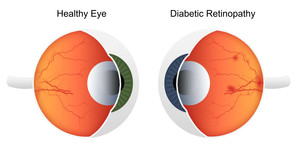How Diabetes Affects the Eyes?
Is any of your close mates or family members are suffering from diabetes?
It is very important to visit a doctor regularly if they are suffering from diabetes. There is a close link between diabetes and eyes which is discovered during routine checkups. Most of the people suffering from diabetes have minor issues but some diabetic diseases cause blindness. That is why it is very important to be aware of this condition.
There is a confusing all over the world what diabetes is. Around 90 percent of people in this world are suffering from type 2 diabetes. It is caused when the body is not able to produce the required insulin for functioning properly and the cells do not react to insulin at times. Insulin is a body regulating hormone. Usually this type develops after the age of forty. Similarly there is type 1 diabetes. It is developed at an earlier stage. At this stage the body produces low amount of insulin or no insulin at all. Insulin injections are used to control this type. Gestational diabetes is another type which is temporary and occurs during pregnancy time.
How it affects the eyes?
Diabetes causes the sugar level to increase in blood. Further it imbalances various functions in eyes as well as other parts of the body. Diabetes Retinopathy causes blindness in eyes and almost 8 million US people are suffering from this condition. It causes leakage or blockage in the blood vessels which supplies blood to the retina. Diabetic maculopathy is another condition which affects the macula of eyes. It becomes difficult to recognise someone with the eyes. Sometimes the macula gets swollen up and is called macula edema causing severe vision loss.
Glaucoma is a condition in which the increased blood level causes pressure in eyes and damages the nerves. 40 percent of people with diabetes are likely to get this condition. Cataract is another condition caused by diabetes. Excess sugar in blood causes accumulation in eyes affecting the water content in eyes. The lens gets stretched as a result and it gets to its normal shape when the sugar level goes down. Nearly 60 percent of people with diabetes are more likely to get cataracts.
Diabetic retinopathy and glaucoma do not show any symptom at the earlier stage. It is very important to check your eyes regularly if you have diabetes and protect your eyes from vision loss.



 Dec 9th 2019
Dec 9th 2019